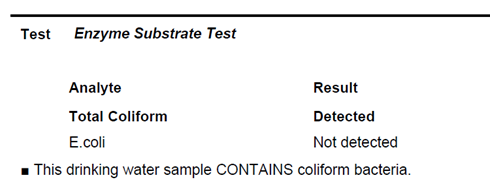Test your drinking water regularly.
It is important to regularly test your private well or spring for contaminants to make sure your water is safe to drink.
If you get a water bill, you are on public water. The Health Department recommends testing your water for lead. Learn about testing recommendations for public water
How to Test Your Private Drinking Water
The Health Department recommends testing your water with the Homeowner Testing Package every five years, and for bacteria every year. This package includes tests for bacteria, inorganic chemicals and gross alpha radiation, which are the most common drinking water contaminants in Vermont.
It's important to test your water if you are buying or selling a property, or if you are a landlord who rents property with a private water source. Find information for real estate transactions and rental properties
Follow the steps below to test your water and find out if you need to treat it.

